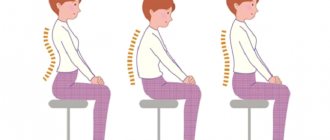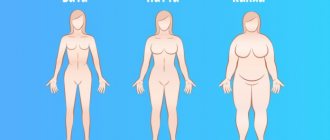Anorexia is a mental illness, the main symptom of which is an eating disorder, characterized by an inadequate assessment of one’s appearance, a pathological desire to lose weight, a panicky fear of being overweight and a distorted attitude towards food.
Although cases of anorexia have been described for a very long time, their number has been growing rapidly in the last couple of decades. This disease is most common among teenage girls aged 14-18 years; among teenage boys, the disease is 10 times less common.
Signs of developing anorexia
- constant preoccupation with one's weight and appearance;
- reluctance to eat at a common table;
- constant dissatisfaction with the achieved result, although the weight loss was greater than planned;
- distorted perception of one’s appearance: even with severe emaciation, the teenager sees himself as fat;
- non-recognition of illness;
- depression;
- fatigue, irritability;
- cessation of menstruation in girls;
- alternating periods of aversion to food with bouts of bulimia;
- calorie counting, constant weighing;
- mirror symptom: constantly looking for figure flaws in front of the mirror.
In the case of bulimia, a person first experiences extreme hunger and cannot stop eating, and then experiences feelings of guilt and self-loathing, causing vomiting.
The disease begins to develop in adolescence because rapid changes occur in the body, hormonal changes, which indicate the need to soon enter adulthood:
- accept your sexuality
- adapt to new relationships and demands of society.
Such a morbid interest of a girl or boy in his body means that mentally he (she) is not ready for these life tasks. The inability to adequately adapt to reality shifts to dissatisfaction with one's body . The teenager says to himself and everyone around him: if only I were thin and looked normal, then everything would be fine with me. And if you don’t notice this problem in time, you can waste precious time. Because while a teenager is focused on his appearance, he loses his position in other areas: he abandons his studies, narrows his social circle, etc.
In addition, an unbalanced and extremely poor diet after some time begins to affect the nervous and hormonal systems, which aggravates the condition of increased fatigue, anxiety and depression.
Symptoms and causes of anorexia
If you still have questions, we can ask them using the Doctis service.
Causes of anerexia
A friend’s daughter is actually starving herself... Are modern beauty standards really that important for young girls?!
Anorexia nervosa - this is how this disease is correctly called - outwardly really looks like an attempt to meet a fashionable standard, an ideal image. But the real reason is inside. A teenager is a person with an unsettled worldview, often with low self-esteem, and an unstable mood. He is looking for himself, thinks a lot about himself, against this background depression can begin unnoticeably with an excessive fixation on appearance and, in particular, weight. A person feels not good enough, not too beautiful, not ideal. Then suddenly someone’s careless statement overflows this cup.
In the minds of the girls themselves, anorexia nervosa begins from the moment when her father or young man said to her: “What a chubby little girl you are!” If you ask in detail, it turns out that it all started much earlier. There was a depressed mood, against this background - comparing myself with a friend who is considered ideal, or with a star of a glossy magazine. Gradually, an idea of myself was formed as not attractive enough, plump - even though in reality it might not have been plump.
I repeat once again: external factors are less important, what is happening inside is much more significant.
Signs of anerexia nervosa
My daughter has always been an excellent student and played sports. Could an always busy, goal-oriented teenager also have signs of anorexia nervosa?
Anorexia nervosa is often a disease of excellent students and perfectionists. The desire to always be the best is an expression of anxiety and low self-esteem, which must always be supported by some results: grades, achievements in sports, in creativity. Unfortunately, these are the children whose parents are very happy: after all, they are obedient, get straight A's in their grades, and are constantly “on the job.” Unfortunately, it’s bad when a child has his whole day planned out and doesn’t have any space “for himself.”
A teenager with stable self-esteem can be told every day that he needs to lose weight, but he will not be particularly worried about this. But a child who tries very hard to meet the aspirations of his parents or friends may well torment himself with strict diets.
Another type is bulimic: these are those who do not refuse food, but overeat and cause themselves to vomit. Teenage girls often behave this way, prone to emotional outbursts, conflicts, skipping school, leaving home, and even harming themselves. They feel that they are not good enough for their parents and protest against this.
3. My daughter has obvious signs of anorexia nervosa; she hardly eats. She thinks I'm exaggerating. How to persuade her to go to a psychotherapist?
Almost always, the girl does not want to go to the doctor, believing that everything is fine with her. Parents should not say: “You are bad, things are bad with you, you need to improve, get treatment” - this will correspond to the daughter’s attitude towards herself, her perception of herself as not good enough for mom and dad. Express your own concerns, say something like: “I think something is bothering you, you’re worried. Let's just talk to a specialist, listen to his opinion and advice. If you like it, you can follow the recommendations, if not, you’ll just leave.” Then, of course, it’s up to the specialist psychologist to see how much he can find a common language.
As a rule, in addition to depression, patients have sharp mood swings, so it is necessary to prescribe antidepressants and mood stabilizers.
I always remember the girl for whom one conversation was enough. She was completely convinced that everything was fine with her, her mother was just exaggerating. However, it was enough to describe what was happening in her body. I wasn’t talking about her specifically, but what generally happens to people with these diseases: how they feel, how hormones behave, what processes take place in their internal organs. Later, the mother said that her daughter was so impressed that she started eating even before the drug treatment began to take effect.
Anerexia and schizophrenia
4. I heard that anorexia nervosa can be a manifestation of schizophrenia. Are these diseases really related?
The main syndrome in anorexia nervosa is dysmorphophobia, that is, exaggerated dissatisfaction with one’s body. With “classical” anorexia nervosa, which we have talked about so far, we observe depression, anxiety, mood swings, excessive fixation on appearance, but in general the person is adequate.
But it happens that these experiences extend to all areas of life, and in an already delusional form. For example, a person refuses to go outside because he believes that everyone there is looking at his figure. If he hears laughter, he claims that they are laughing at his excess weight.
Often such people become overly fixated on what is happening in their body. For example, they are convinced that eating meat is harmful because it rots in the body. (Please note, this is not about delusion, but about confidence). Or they refuse to eat because they allegedly cannot digest food, their stomach has stopped working (although there are no objective symptoms).
This is precisely delusion, or, as doctors say, delusional dysmorphophobia. It really points to schizophrenia, a mental disorder for which there is a hereditary tendency. As a rule, older relatives of such a patient had pathologies of desire (for example, alcoholism), mood disorders, etc. Please note that the “classical” anorexia nervosa, which we talked about in relation to young people, does not turn into delusion if there are no prerequisites for this.
How often does anorexia nervosa return to a teenager after treatment?
Depends on whether the patient completed the full course of treatment or interrupted it. Typically, drug treatment should last about a year, including the active phase and the transition to maintenance therapy with minimal doses. As for psychotherapy, the course can range from several months to several years.
The risk of relapse is related to whether the patient has completed the full course of treatment. Some people feel so much better after 3 months that they quit treatment, and after another six months everything resumes for them, and they again turn to doctors. And this can drag on for many years. Moreover, it seems to such patients that they are being treated endlessly, which means that nothing is helping them. Those who complete the course to the end usually do well.
Consequences of anorexia for the body
- changes in hormonal levels (the function of the thyroid gland is disrupted, the formation of sex hormones), which leads to menstrual irregularities and osteoporosis (destruction of bone tissue);
- the number of heart contractions decreases;
- blood pressure decreases;
- the electrolyte composition of the blood changes - the potassium content drops, which causes a disturbance in the rhythm of cardiac activity that is life-threatening;
- increased serum cholesterol levels;
- decrease in the number of leukocytes in the blood;
- development of anemia;
- damage to tooth enamel;
- weight loss (up to 40–50%);
- disruption of the digestive tract (bloating, constipation);
- brittleness of hair and nails;
- memory loss, slow thinking;
- headaches, dizziness;
- frequent fainting.
Diagnosis and treatment of anorexia in adolescents
Unfortunately, visiting a doctor is often delayed and becomes inevitable due to disruption of the functioning of all systems and organs.
When examining a patient, the doctor uses special questionnaires and projective tests, laboratory diagnostics and studies of the condition of the gastrointestinal tract.
Psychiatrists treat anorexia in adolescents. Complete recovery is possible only with complex therapy, which includes:
- psychotherapeutic methods;
- drug therapy;
- therapeutic nutrition.
The goal of treatment is to normalize eating habits, correct psychopathological manifestations and consolidate progress.
You suspect your child has anorexia. What to do?
Due to their severe consequences, eating disorders such as anorexia and bulimia are life-threatening and require immediate professional help.
Treatment requires psychotherapy with the obligatory, at least at the first stage, use of medication prescribed by a psychiatrist. Therefore, if you notice at least a few of the above signs in your child, be sure to contact a psychologist and (or) psychiatrist .
Unfortunately, statistics indicate that a third of patients return to obsessions with weight control and nutrition. And the decisive factor is the time of contacting a specialist.
The sooner help is provided, the greater the chance of a complete cure for the disease!
Causes of anorexia in children
Among the prerequisites for the development of the disease are:
- Genetic. It is believed that children of schizophrenics, bulimics, and people with endogenous psychoses are more likely to experience anorexia.
- Biological. This refers to early puberty. Girls who acquire a feminine figure earlier than their peers often have complexes due to fat deposits in the chest, buttocks, and abdomen. Then they try to lose weight so as not to stand out from their classmates.
- Family. Psychologists have found that symptoms of anorexia often occur in children whose parents are overprotective. It is unacceptable to control every step of a child, to impose your point of view on him, to force him to eat. Otherwise, deliberate fasting will become a way to deal with parental pressure.
- Personal. Children who have an inferiority complex and inadequately low self-esteem are prone to violations. They react painfully to any criticism. Attempts to lose weight are seen as an opportunity to become better.
- Cultural. Today, clothes are advertised mainly by thin models. Growing up girls everywhere see ideal thin bodies that do not have a single gram of excess fat. Because of this, they begin to evaluate themselves very strictly and try to live up to the established ideal.
Regardless of the reason for which childhood anorexia developed, it needs to be treated. Otherwise, the consequences will be irreversible.
Anorexia accounts for only 5% of all eating disorders
“It is too early to conclude that a child has an eating disorder if he simply controls his diet or refuses certain foods,” says Anna Vladimirovna Nazarenko, head of the Eating Disorders Clinic. These days, many parents are frightened by terrifying television programs about anorexia. All the media are trumpeting about it, magazines are full of photographs of anorexic models, doctors right and left are making this diagnosis, at first glance, to girls who are not at all suffering from excessive thinness. But what do we know about other eating disorders? According to statistics of visits to eating disorder clinics, 70% of cases are bulimia, 25% are compulsive overeating and only 5% are anorexia. That is: it is bulimia that is considered the most widespread food addiction, a real epidemic among girls, women and even men concerned about their weight and figure.”
Anna Vladimirovna Nazarenko, head of the Eating Disorders Clinic
Anorexia, bulimia and compulsive overeating have both common symptoms and main differentiating features. It is not for nothing that they are put on a par with such addictions as alcoholism and drug addiction: only in this case food acts as a “drug”. Quite often, anorexia and bulimia occur in adolescence due to dissatisfaction with one’s figure and dieting.
Anorexia is a partial or complete refusal to eat, which leads to weight loss and the occurrence of various associated diseases.
Compulsive overeating is constant uncontrollable bouts of binge eating, leading to excess weight and associated diseases.
Bulimia - repeated bouts of binge eating followed by purging, getting rid of what you have eaten by inducing vomiting.
Bulimia is not only the most common food addiction, but also the most difficult to recognize: this eating disorder is asymptomatic for a long time, and the consequences of the disease can be very serious.








